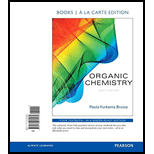
Interpretation:
The percent of each enantiomer in the given solution has to be calculated.
Concept introduction:
The pair of Enantiomers has different configurations.
Pair of enantiomers has different optical activity, which means if one will show levorotatory then the other will show dextrorotatory.
The direction and magnitude of rotation of plane-polarized light by an optically compound is measured by using polarimeter.
This rotation of polarized light is specific for a compound at specified temperature and wavelength, so it is called as Specific rotation of that compound.
The specific rotation of enantiomers has equal magnitudes and opposite signs.
Specific rotation of compound is calculated by,
If the mixture contain unequal amount of enantiomers of a compound, then the amount of excess of enantiomer is called enantiomeric excess or optical purity. It is calculated by,
Trending nowThis is a popular solution!

Chapter 4 Solutions
Organic Chemistry, Books a la Carte Edition (8th Edition)
 Organic ChemistryChemistryISBN:9781305580350Author:William H. Brown, Brent L. Iverson, Eric Anslyn, Christopher S. FootePublisher:Cengage Learning
Organic ChemistryChemistryISBN:9781305580350Author:William H. Brown, Brent L. Iverson, Eric Anslyn, Christopher S. FootePublisher:Cengage Learning

